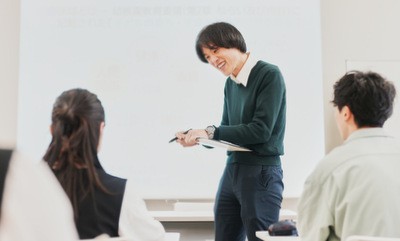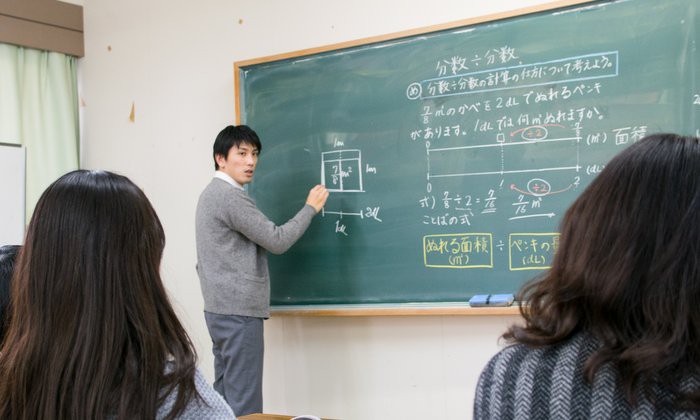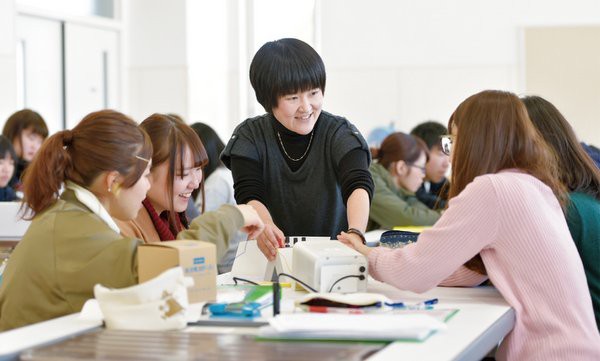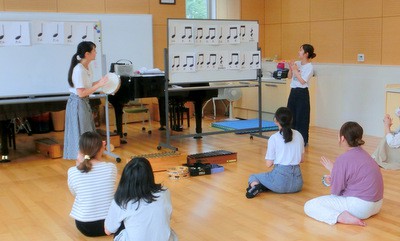School of Education
School of education does not admit international students.
Aspects of Education
Support Program for the Teacher Recruitment Examination
Abundant Free-of-Charge Prep Courses
Preparation courses begin in the first year, with special preparation camps in the second and third years, and continue until just before the final examination in the fourth year.
All preparation courses are free of charge.

Practical Training Course for Childcare Providers
Build up your skills through exam preparation, learning together, etc.
Practical Training Course for Childcare Providers begins in the second semester of the first year, students practice and study mock childcare, prepare for the civil service and teacher registration examinations, and learn together with other students from all grades. And there is a special prep camp in the second and third years.
Subject-Specific/Teaching Seminars
Developing Skills Pertinent to the Subject
For the Elementary School/Kindergarten Course students, seminars such as “Science and Mathematics Education Seminar” and “English Seminar” to develop skills that are important for particular subjects are available and students can participate from their first year.
For the Kindergarten/Nursery School Course, seminars on crafting for children, children’s culture, music, etc. are offered.

Dedicated Support in Small-Class System
Support that is Only Possible at a Small Institution
The small number of students means that students and faculty work closely, and we provide personalized and attentive support to each student. We also consider opportunities for students to work independently in a home-like atmosphere very important.

The 3 Policies
01
Diploma Policy
Qualities Students Should Acquire by Graduation
The School of Education certifies graduation of students who acquired 128 credits and the cumulative GPA of 1.5 or more that are required for undergraduate graduation and the following disciplines, and grants degrees (Bachelor (Edu.)).
- Can recognize the current situation and issues in various international and domestic problems related to our society and education, and have ability to come up with countermeasures against the problems.
- Passionate as an educator and acquired the right sense of ethics and responsibility.
- Acquired adequate writing, presentation and communication skills that are expected of an educator.
- Acquired learning competence to study continuously and voluntarily matters related to education.
- Acquired ability to put educational ideas into practice.
- Acquired basic and applied knowledge in the field of expertise and in teaching.
- Acquired basic conversation skills in English and musical skills.
02
Curriculum Policy
Curricular Structure and Implementation Policy
In the School of Education, the curricula are categorized into “Liberal Arts Fundamental Courses”, “Liberal Arts Advanced Courses”, “Specialized Fundamental Courses”, “Practicum Courses (Teaching / Childcare)” and “Senior Thesis”, and students take the liberal arts courses from the basic to the advanced, and the specialized courses in a systematic as well as step-by-step manner from the basic to the advanced. The program is organized so that after completing these courses, students move on to doing practicums and acquire the ability to put educational ideas into practice. As the culmination of all that they have learned at the college, they write up a Senior Thesis.
- We have “Freshman Seminar” and “Shinobugaoka Kyoyo I-III” for students to learn local history and culture as part of the Liberal Arts Fundamental Courses, and “Humanities/Arts”, “International/Social Sciences”, “Natural Sciences”, “Foreign Languages” and “Health/Physical Education” in Liberal Arts Advanced Courses. These courses have been organized in this manner to provide education needed to become a good member of society and nurture ability to think about various issues in education and their solutions logically.
- In order for students to recognize a passion, sense of ethics and roles in society as an educator, “Shinobugaoka Kyoyo” and other courses including “Principles of Education”, Educational Psychology”, “Social Welfare”, “Social Care”, “Family Welfare for Children” and “Family Support” are offered.
- There are courses such as “Shinobugaoka Kyoyo”, “Japanese Expression”, “Words and Play”, etc. in order to improve students’ basic communication skills such as speaking, listening and writing.
- There are courses such as “Shinobugaoka Kyoyo”, “Pedagogy in Moral Education”, “Pedagogy in Special Activities”, “Cooperative Learning”, “Senior Thesis”, etc. for students to acquire ability to learn continuously and voluntarily to accommodate the changes in society.
- There are courses (such as “Japanese (including calligraphy)”, “Social Studies”, “Mathematics”, “Science”, “Home Economics”, “Music”, “Piano and Voice”, “Living Environment Studies”, “Art and Handcraft” and “Physical Education”) that specialize in particular subject, as well as “Information Processing”, “Structure of the Educational Curriculum” and “Introduction to Special Education” courses for students to learn specialized methodologies and acquire knowledge in a systematic manner and to reinforce practical skills in teaching.
- To acquire basic knowledge in the specialized courses, [Specialized Basic Courses], [Specialized Courses] ((subject・basic skills), (TC course・pedagogy), (student guidance・educational counselling), (childcare・pedagogy) and (expression skills in childcare)) [Practicum Courses] and [Senior Thesis] are offered in stages. As subjects, pedagogy in each of the following areas of studies (Japanese, Social Studies, Mathematics, Science, Living Environment Studies, Music, Art and Handcraft, Home Economics and Physical Education), “Educational Counselling”, “Theories and Methods of Student Guidance”, “Instruction of Teaching Practicum”, “Teaching Practicum”, “Practical Applications in the Teaching Profession (Kindergarten・Elementary School)”, “Theories in Class Management”, etc. are offered.
- To nurture English Communication skills and musical skills, “English”, “English Activities of Children”, “English Communication”, “Music”, “Musical Activities of Children”, “Piano and Voice” courses are offered.
03
Admission Policy
The Ideal MIC Student
The School of Education has a policy to admit those individuals who have the knowledge, skills and determination as listed below in order to acquire the Educational Philosophy and the Objectives of the School, and the knowledge, skills and determination as listed in the Diploma Policy at the time of graduation.
- Have acquired a comprehensive understanding of what was taught in high school education.
- Have a strong determination to work in a position that makes use of their expertise in the field of education and childcare.
- Have acquired the basic knowledge, Japanese, English and musical skills necessary to study the curriculum in the field of education and childcare.
- Have developed basic lifestyle habits and autonomous learning.
- Able to voluntarily investigate and logically explain various issues arising in society.
- Have experience of extra-curricular and volunteer activities in high school and are able to actively participate in these activities in collaboration with others.
- Have acquired exceptional skills (such as in sports, arts and culture).
Teacher Licence Programs
[Elementary School/Kindergarten Course]
- Level 1 Elementary School Teacher License
- Level 1 Kindergarten Teacher License
[[Kindergarten/Nursery School Course]
- Level 1 Kindergarten Teacher License
- Nursery School Instructor Certification
Career Choices
[Elementary School/Kindergarten Course]
Elementary school teacher, kindergarten teacher, education-related companies, local public organizations, etc.
[Kindergarten/Nursery School Course]
Kindergarten teacher, nursery school teacher, certified children centers, child welfare facilities, nursery school and kindergarten education-related companies, local public organizations, etc.


